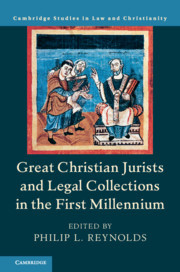Great Christian Jurists and Legal Collections in the First Millennium Law and Christianity Series
Langue : Anglais
Coordonnateur : Reynolds Philip L.

Shows how Christian leaders before 1000 CE understood law and used normative texts and practices for social order and eternal salvation.
Great Christian Jurists and Legal Collections in the First Millennium is a systematic collection of essays describing how Christian leaders and scholars of the first millennium in the West contributed to law and jurisprudence and used written norms and corrective practices to maintain social order and to guide people from this life into the next. With chapters on topics such as Roman and post-Roman law, church councils, the papacy, and the relationship between royal and ecclesiastical authority, as well as on individual authors such as Lactantius, Ambrosiaster, Augustine, Leo I, Gelasius I, and Gregory the Great, this book invites a more holistic and realistic appreciation of early-medieval contributions to the history of law and jurisprudence for entry-level students and scholars alike. Great Christian Jurists and Legal Collections in the First Millennium provides a fresh look, from a new perspective, enabling readers to see these familiar authors in a fresh light.
Part I: 1. Normative texts and practices of the first millennium Philip L. Reynolds; 2. The many voices of Roman law Jill Harries; 3. The law of the post-Roman kingdoms Alexander Callander Murray; 4. Ecclesiastical councils Gregory I. Halfond; 5. The papacy Clemens Gantner and Stefan Schima; 6. The sacred palace, public penance, and the Carolingian polity Mayke de Jong; 7. Canonical collections Roy Flechner; 8. The practice and literature of penance Rob Meens; 9. Monastic rules Albrecht Diem; Part II: 10. Lactantius Elizabeth De Palma Digeser; 11. Ambrosiaster David Hunter; 12. Augustine Brian Gronewoller; 13. Leo I Susan Wessel; 14. Gelasius I Bronwen Neil; 15. Dionysius Exiguus David Heith-Stade; 16. The rule of Benedict Hugh Feiss; 17. Gregory the Great Carole Straw; 18. Isidore of Seville Luca Loschiavo; 19. Pseudo-Isidorus Mercator Clara Harder; 20. Jonas of Orléans Francesco Veronese; 21. Hincmar of Reims Charles West; 22. Regino of Prüm Greta Austin; 23. Burchard of Worms Greta Austin; 24. New horizons in church law Robert Somerville.
Philip L. Reynolds is Charles Howard Candler Professor of Medieval Christianity and Aquinas Professor of Historical Theology at Emory University, Atlanta. A senior fellow of Emory's Center for the Study of Law and Religion, Reynolds directed the Center's project on the Pursuit of Happiness (2006–11). Reynolds was a Henry Luce III Fellow in Theology (2013–14) for his work on contemplative and apophatic theology and on the medieval reception of the pseudo-Dionysius. His books include Food and the Body (1999) and How Marriage Became One of the Sacraments (Cambridge, 2016).
Date de parution : 06-2019
Ouvrage de 506 p.
15.6x23.4 cm
Disponible chez l'éditeur (délai d'approvisionnement : 14 jours).
Prix indicatif 141,33 €
Ajouter au panierThème de Great Christian Jurists and Legal Collections in the... :
© 2024 LAVOISIER S.A.S.



